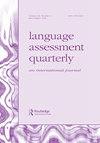The Relationship between Word Difficulty and Frequency: A Response to Hashimoto (2021)
IF 2.8
2区 文学
0 LANGUAGE & LINGUISTICS
引用次数: 7
Abstract
ABSTRACT Hashimoto (2021) reported a correlation of −.50 (r 2 = .25) between word frequency rank and difficulty, concluding the construct of modern vocabulary size tests is questionable. In this response we show that the relationship between frequency and difficulty is clear albeit non-linear and demonstrate that if a wider range of frequencies is tested and log transformations are applied, the correlation can approach .80. Finally, while we acknowledge the great promise of knowledge-based word lists, we note that a strong correlation between difficulty and frequency is not, in fact, the primary reason size tests are organized by frequency.单词难度和频率之间的关系:对桥本的回应(2021)
摘要Hashimoto(2021)报道了词频等级和难度之间的相关性为−.50(r2=.25),得出的结论是现代词汇大小测试的结构值得怀疑。在这个响应中,我们表明频率和难度之间的关系是明确的,尽管是非线性的,并证明如果测试更宽的频率范围并应用对数变换,相关性可以接近.80。最后,虽然我们承认基于知识的单词表的巨大前景,但我们注意到,难度和频率之间的强相关性实际上并不是按频率组织大小测试的主要原因。
本文章由计算机程序翻译,如有差异,请以英文原文为准。
求助全文
约1分钟内获得全文
求助全文

 求助内容:
求助内容: 应助结果提醒方式:
应助结果提醒方式:


